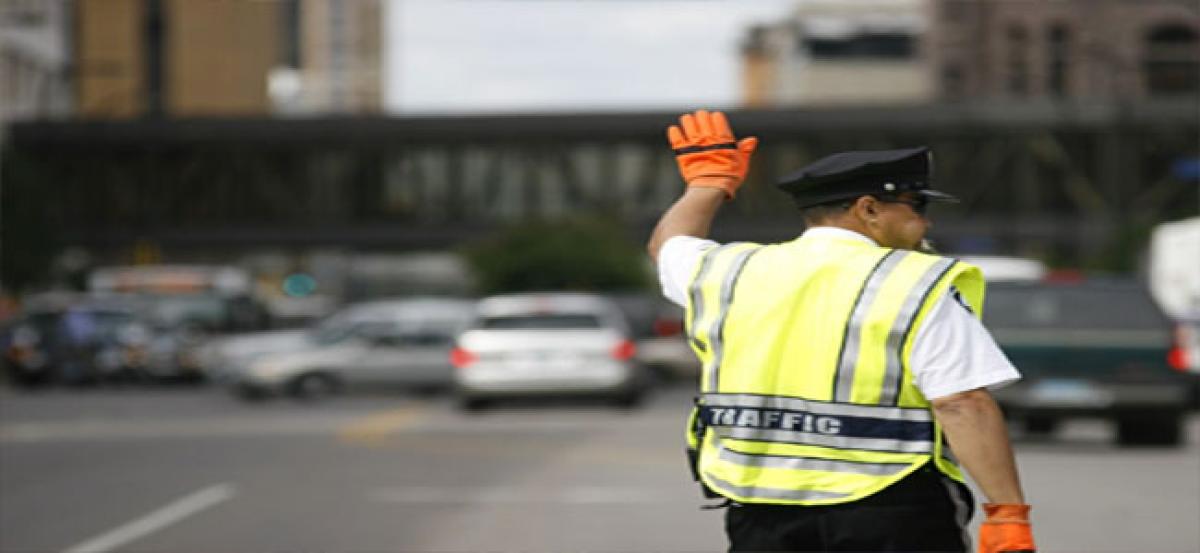Live
- NCB, Gujarat ATS seize 500 Kg of drugs in joint op in Porbandar
- Senior citizens of all states to get 25pc bus fare concession in Andhra
- India’s total exports likely to surpass $800 billion in coming months: Industry
- Almost half of injury-related hospitalisations in Australia caused by falls: Report
- Tribals ignored by past regimes, remain top priority in NDA govt: PM Modi in Jamui
- South Korea: Opposition leader sentenced to suspended prison term for violating election law
- Ajinkya Rahane to lead Mumbai in Syed Mushtaq Ali Trophy
- My thought process and motivation have always been team first: KL Rahul ahead of IPL 2025 auction
- 'You’re going to get dropped': Warner issues warning to Fraser-McGurk after dire ODI campaign
- Kartik Purnima 2024: Key Guidelines to Observe for a Blessed Day
Just In

The city police\'s traffic department today told the Bombay High Court that it had taken various steps to curb illegal activities including instances of traffic policemen demanding and accepting bribe from motorists. Joint Commissioner of Police (Traffic) Amitesh Kumar submitted an affidavit before a division bench of Justices R M Savant and Sadhana Jadhav, listing the steps including creation of a
Mumbai: The city police's traffic department today told the Bombay High Court that it had taken various steps to curb illegal activities including instances of traffic policemen demanding and accepting bribe from motorists. Joint Commissioner of Police (Traffic) Amitesh Kumar submitted an affidavit before a division bench of Justices R M Savant and Sadhana Jadhav, listing the steps including creation of an email ID on which the public can send complaints against the traffic police.
The bench, hearing a public interest litigation filed by a traffic constable alleging rampant corruption in the traffic police department. The high court had last month asked the traffic police to file an affidavit.
According to the affidavit, various steps have been taken in the past to ensure transparency in the working of the traffic branch of Mumbai Police, and that the issue is a matter of top priority for the Mumbai city police in general, and the traffic control branch in particular.
The affidavit also stated that in the past one year, over 5,000 CCTVs have been installed in a phased manner at major traffic intersections. "All these cameras are connected to the traffic control room and also to the office of the joint commissioner of police, traffic department. The activities of all traffic police personnel at various locations, including intersections, are continuously monitored in the control room minutely and whenever any suspicious activity is noted immediate action is taken," the department said.
In order to minimise cash handling by the traffic police personnel, a cashless system of collecting fines and penalties through e-challans has been introduced on a pilot basis in October last year, it further said. "The traffic police is equipped with 900 e-challan handsets of latest technology. The introduction of e-challan has wiped out the old cash collection system.
This has left less scope for the enforcement personnel to get involved in illegal activities," it said. It said that with the help of CCTV cameras, traffic violations are captured through photographs, after which challan is issued to the violator on mobile through SMS describing the penal sections, amount of compounding fees, photographs and a link of the payment portal.
"This system is useful to ensure that there is less human interference and therefore, it is effective to achieve transparency in the enforcement operations," the department said. According to the affidavit, from October last year till date, approximately 9,20,000 challans have been issued and an amount of Rs 9,20,668 has been collected towards fine.
The affidavit also said that a dedicated email ID has been created where people can send complaints against traffic policemen which would be verified and action would be initiated. The court said the traffic department should widely publicise the email ID. "Do not keep it under wraps. Publicise it widely so that people know about it," Justice Savant said.
Additional public prosecutor Prajakta Shinde orally told the court today that since October last year, departmental action has been initiated against 13 policemen over complaints received against them. The court, after perusing the report, said it was satisfied that the traffic department was on the right path.
"The steps taken in Mumbai should be undertaken in other districts too," the court said, posting the matter for further hearing after eight weeks. According to the affidavit, the traffic police is planning to induct 100 body-worn cameras on a pilot basis which will record (audio and video) all communications between the policemen on road and traffic violators.
"This would help in evidence-based policing and bring about a great deal of transparency in policing," it said. The traffic police department said in the affidavit that it would request the civic body and other authorities to plan underground and other pay and park slots in the city to prevent parking on roads.

© 2024 Hyderabad Media House Limited/The Hans India. All rights reserved. Powered by hocalwire.com







